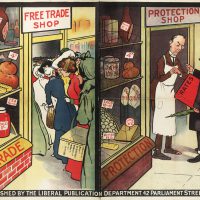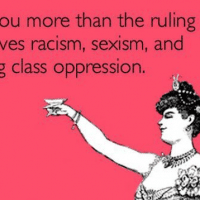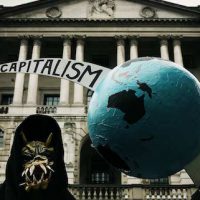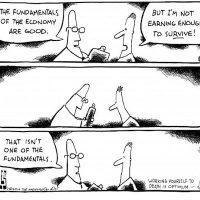-
Microbes are striking back
Our story has a mix of the good and the bad. It shows us that science, as a collective human endeavour, has immense potential. It also shows us that as a society, under capitalism, we often do our best to undermine the fruits of human knowledge.
-
U.S. militarism marches on
Republicans and Democrats like to claim that they are on opposite sides of important issues. Of course, depending on which way the wind blows, they sometimes change sides, like over support for free trade and federal deficits. Tragically, however, there is no division when it comes to militarism.
-
Racism and the logic of capitalism
The emergence of a new generation of anti-racist activists and thinkers battling police abuse, the prison-industrial complex and entrenched racism in the US, alongside the crisis over immigration and growth of right-wing populism in Europe and elsewhere, makes this a crucial moment to develop theoretical perspectives that conceptualise race and racism as integral to capitalism while going beyond identity politics that treat such issues primarily in cultural and discursive terms.
-
Capitalism’s discourse on “development”
CAPITALISM’S discourse on “development” which has become quite influential all over the third world in the neo-liberal period proceeds as follows.
-
Why Russia is growing gold reserves to record levels
According to Russian Central Bank figures, Russia’s total gold reserves amounted to 1,944 tons as of June 2018, with the regulator pointing to a steady rise in holdings of the precious metal over the last decade (total gold reserves amounted to less than 500 tons in 2008). In the same period, the share of gold in Russia’s total reserves grew from just 2.5 percent to over 17 percent.
-
Three globalizations, not two
The conventional wisdom is there have been two globalizations in the modern era. This paper challenges that view and argues there have been three globalizations, not two.
-
Did developing countries recover from the global crisis?
A decade after the Global Financial Crisis, developing countries still bear the scars in the form of lower growth and investment rates.
-
“We need new revolutionary tools to advance the struggle of the working class”
To this day, “NUMSA has not deviated from its perspective of Marxism, Leninism and its goal of building a socialist South Africa,” says Karl Cloete
-
Democratic Party politics 101 with Alexandria Ocasio-Cortez and the corporate media
Some who read my writing may ask, “why don’t you criticize the Republicans as much as you do the Democrats?” My response to such a question is that it should be obvious by now which of the two corporate parties currently holds the Black polity and working class “constituencies” generally in a state of political captivity.
-
Globalization checkmated? Political and geopolitical contradictions coming home to roost
The deepening of economic globalization appears to have ground to a halt and the process may even unravel a little. The sudden stop has surprised economists, whose belief in globalization has strong parallels with Fukuyama’s (1989) flawed end of history hypothesis.
-
Disappearing poverty
In international human rights law, a “forced disappearance” occurs when a person is secretly abducted or imprisoned by a state or political organization (or by a third party with the authorization, support, or acquiescence of a state or political organization), followed by a refusal to acknowledge the person’s fate and whereabouts, with the intent of placing the victim outside the protection of the law.
-
U.S. manufacturing is far from healthy and the main reason appears to be globalization
Public awareness and acceptance of the negative consequences of corporate-driven globalization on U.S. workers has grown dramatically over the last years, aided in part by Donald Trump’s attacks on trade agreements like NAFTA.
-
Making War on the Planet: Geoengineering and Capitalism’s Creative Destruction of the Earth
The enormous dangers that rapid climate change present to humanity as a whole, and the inability of the existing capitalist political-economic structure to address them, symbolized by the presence of Donald Trump in the White House, have engendered a desperate search for technofixes in the form of schemes for geoengineering, defined as massive, deliberate human interventions to manipulate the entire climate or the planet as a whole.
-
Correcting the record: what is really happening in Nicaragua?
There is a great deal of false and inaccurate information about Nicaragua in the media. Even on the left, some have simply repeated the dubious claims of CNN and Nicaragua’s oligarchic media to support the removal of President Ortega. The narrative of nonviolent protesters versus anti-riot squads and pro-government paramilitaries has not been questioned by international media.
-
Russiagate is a ruling class diversion
So this is what we can look forward to in the long twilight of a shrinking U.S. empire: the shrieks of a delirious ruling class, concocting endless diversions from the central reality of late-stage capitalism’s inability to offer the people anything but widening wars and deepening austerity.
-
Against reductionism: Marxism and oppression
The relationship between oppression and class has always been an important question for Marxists and has been the subject of numerous debates between socialists and among the left more broadly.
-
The relationship between racism and capitalism
Revulsion is building towards the smokescreens of hypocrisy, racism, and nationalism barely masking capitalism’s ongoing failure to provide the jobs and incomes people need.
-
Τhe structural, fundamental factors pushing western capitalism into producing totalitarianism and war
Thank you very much for your kind invitation to participate in this very interesting, I would say even intriguing conference on Marx and Marxism, held in Beijing and coinciding with the celebration of the 200 years since the birth of Karl Merx, the thinker who has contributed as nobody else to demystifying our Social Being.
-
On capital-imperialism: an interview with Virgínia Fontes
In her book Reflexões im-pertinentes: História e capitalismo contemporâneo published in 2005, she examined the development of capitalism and its new forms of commodification through a combination of theoretical reflection and empirical analysis. Based on the concept of expropriation, her research reflects a recovery of the critique of political economy in social theory.
-
I ran out of words to describe how bad the recovery numbers are
Back in June, Neil Irwin wrote that he couldn’t find enough synonyms for “good” to adequately describe the jobs numbers.




















